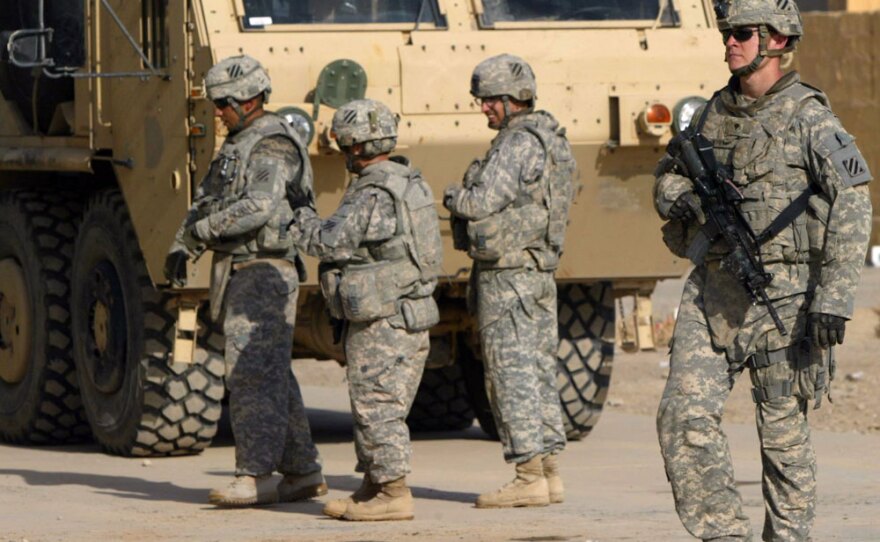When President Obama uses a prime-time address Tuesday to mark the official end to U.S. combat operations in Iraq, he'll have to sidestep the shadow of former President George W. Bush's "Mission Accomplished" banner.
The "Mission Accomplished" speech, which Bush delivered on the deck of a returning aircraft carrier in May 2003, haunted the Bush administration as Iraq spiraled downward into insurgency and sectarian conflict amid problems that haven't been fully resolved today.
Obama pledged at the outset of his presidency that America's combat role in Iraq would end by Sept. 1; the last U.S. combat brigade -- under the Pentagon's definition of the role of troops -- has left Iraq.
But it's expected that the 50,000 American service men and women remaining in Iraq will see more combat. They face a persistent insurgency in a country whose political establishment has been unable to form a government since elections in March.
More than seven years after the U.S. invasion, Iraq's major cities remain without adequate electricity and other government services.
Taking Credit At A Crisis Point
The problem for Obama, observers say, is how to take credit for reducing the American military presence in Iraq while acknowledging the parts of the mission that haven't been accomplished.
Compounding the challenge, analysts say, Obama must maintain the flexibility to deal with problems as they arise there.
Michael O'Hanlon, a senior fellow at the Brookings Institution, says Iraq is at a "mini crisis point," making it a difficult time to take political credit. Instead, O'Hanlon says, Obama should address the questions of Iraqi security and governance that remain.
As Obama prepares to speak, Iraq is under the highest level of security alert, after insurgents linked to al-Qaida claimed responsibility for a series of attacks around the country last week that left nearly 60 people dead.
Top Iraqi military officials have predicted an upsurge in violence as U.S. troops reduce their combat role and insurgents try to undermine public confidence in the Iraqi security forces.
Addressing Concerns Abroad, Polls At Home
It will be Obama's second televised speech from the Oval Office -- the first came earlier this year to address the Gulf oil spill. His focus on Iraq comes at a time when polls show most Americans worried about the sputtering economy and jobs.
We understand that those that would foment violence will still continue to try to do so.
But analysts say it is a chance for Obama, whose approval ratings are also slipping, to demonstrate that he is working to fulfill his campaign pledge of ending America's military engagement in Iraq. White House spokesman Robert Gibbs said Monday that Obama will talk about what was involved in the U.S. troop drawdown and the changing mission in Iraq.
"First and foremost, you won't hear those words coming from us," Gibbs said, responding to questions from reporters Monday about the "Mission Accomplished" comparison. "Obviously tomorrow marks a change in our mission. It marks a milestone that we have achieved in removing our combat troops. That is not to say that violence is going to end tomorrow. We understand that those that would foment violence will still continue to try to do so."
A few hours before Tuesday's address, Obama told troops at Fort Bliss, Texas that the speech was "not going to be a victory lap. It's not going to be self-congratulatory."
"There's still a lot of work that we've got to do to make sure that Iraq is an effective partner with us," he said.
The main area where the president should be careful, O'Hanlon says, "is to avoid locking in the departure of all American troops next year." He says the U.S. military will need the flexibility to keep troops in place to support the Iraqi army and police.
More than 1 million U.S. military personnel have served in Iraq during the course of the war.
The Obama administration has said remaining troops will advise and assist the Iraqi security forces, conduct "partnered" counterterrorism operations and protect U.S. citizens. A White House statement on Monday repeated, however, that "in accordance with an agreement between the U.S. and Iraqi governments, all U.S. forces will leave Iraq by December 31, 2011."
It remains to be seen whether Obama will leave open the possibility of renegotiating that agreement with whatever Iraqi government emerges from the current political deadlock in Baghdad.
Dealing With Iraq's Leadership Vacuum
O'Hanlon says Obama should also address that deadlock in his speech, offering to take a stronger American role in helping to form a new Iraqi government. "He should consider posing some ideas for the U.S. or the international community to serve as a referee."
Vice President Biden, who flew to Baghdad on Monday, said he would press Iraqi leaders to end the deadlock over a new government.
Daniel Serwer, a vice president at the United States Institute of Peace, says the focus of any such diplomacy ought to be on assuring all sides that the democratic process will continue.
The conflict over the government has been portrayed as a clash of personalities between Prime Minister Nouri al-Maliki and former Prime Minister Ayad Allawi -- "a sumo wrestling match," Serwer says. "But what's really going on here is uncertainty about whether democracy will continue in Iraq."
Serwer says Obama could use his speech to assure the Iraqi factions that the United States will try to find a way to guarantee the system.
Copyright 2022 NPR. To see more, visit https://www.npr.org. 9(MDAzMjM2NDYzMDEyMzc1Njk5NjAxNzY3OQ001))






